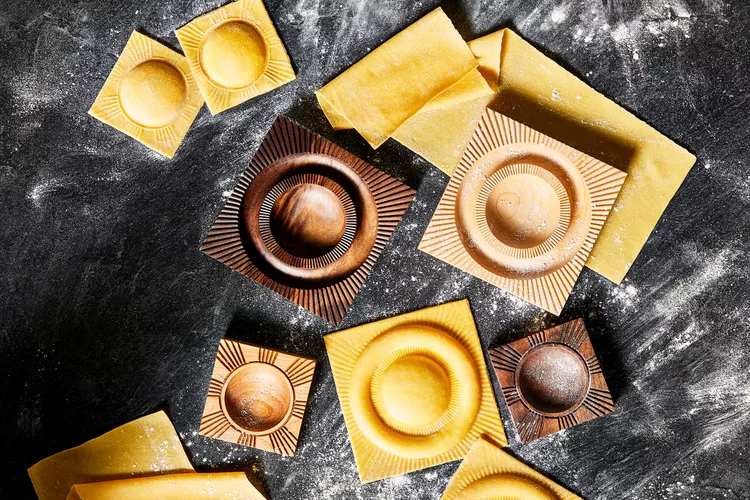John Francis Designs’ handmade pasta molds make a stunning impression.
Before John Welch’s ravioli molds went viral on social media, he took up woodworking as a relaxing hobby – something he could do out on the deck of his home in Lowell, Massachusetts, just him, his imagination, and a glass of whiskey. Welch bounced from big projects, like installing hardwood floors in his parents’ house, to smaller ones, like making serving boards. And then he started carving wooden spoons using two knives that he bought off Amazon. “I love entertaining, and I was like, it’d be really cool to cook dinner for people I care about with a spoon that I made.”
But Welch’s friends wanted spoons of their own, so he made more spoons and bought bigger tools. Within a year, Welch moved into a 200-square-foot space in Lowell. That was 2014. By July 2021, the business, John Francis Designs, had grown enough to move into a 1,000-square-foot studio in neighboring North Chelmsford.
Over the past couple of years, Welch has become known for his intricate, artful pasta molds: spiral- indented boards that imprint grooves on gnocchi and wooden molds that shape ravioli into suns, moons, and other patterns. This obsession began in 2020, when Welch spent a lot of time in lockdown experimenting with homemade pasta. One day, he wondered if he could make a stamp that would leave an imprint on the dough. “I carved these little flowers in the corner of a ravioli mold, and it worked,” he says.
Welch finds inspiration in things as mundane as manhole covers and as seasonal as soup — his sunburst-shaped ravioletti mold came about simply because he was craving something fun and surprising to go swimming in a winter broth. Although he makes a mold with an X and O motif and another with hearts, Welch’s aesthetic veers toward geometric designs. “There’s a fine line between whimsy and just too much,” he says. “I’ve had people reach out to me about custom molds, a shamrock or a baseball. That’s too shticky for me. It cheapens it to an extent.”
Sometimes, though, Welch likes to experiment with the kitschier side of cooking. A recent favorite culinary invention was a pasta play on berries and cream. Welch created “berries” out of pasta dough that he colored with red, blue, and purple food powder and indented with one of his boards. He doused the pasta in a Fontina cheese sauce and a savory cayenne whipped cream and then sprinkled it all with pistachios. The dish looked like a dessert.
That creativity in the kitchen in turn inspires his approach to woodworking. “I’ll be driving in my car and have an idea for something I want to try to cook, and that creates a reason for me to make a new ravioli mold,” Welch says. When testing pastas for the molds, Welch usually sticks to the same flour-water-egg dough, but sometimes he’ll play with the ratio, adding an extra yolk. He always keeps detailed notes on whether the dough was successful, evaluating characteristics like how it tasted, if it was hard to work with, and if it stuck to the mold. Once a mold is finished, Welch will host a dinner party. “I’ve always really enjoyed cooking for other people. When people are coming over, that’s a reason to go all out.”
But Welch doesn’t save his molds, or his homemade pasta, for fancy meals or holidays. His philosophy is to use nice things all the time. “If you’re always waiting for that special occasion, it defeats the purpose,” Welch says. “Every day should have a little bit of a special occasion.”
Same goes for the pasta molds. “You’re already making fresh pasta. That in itself is a nice treat, but why not take it that extra step? Make it a little more special.”



